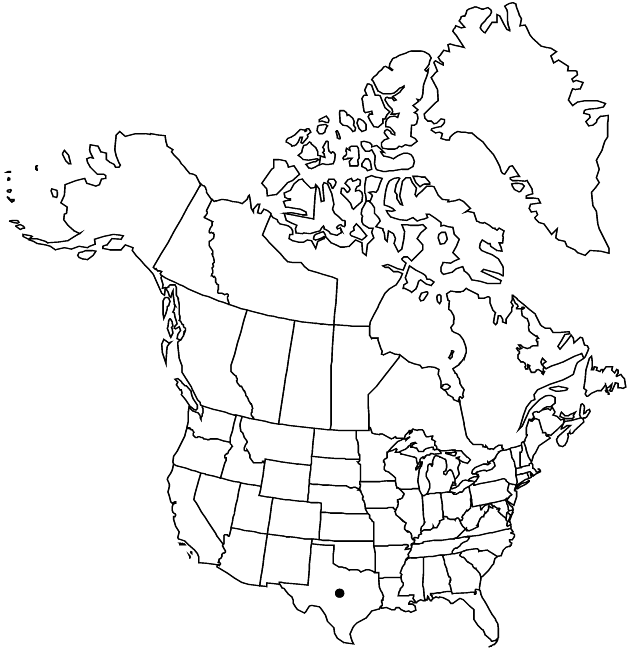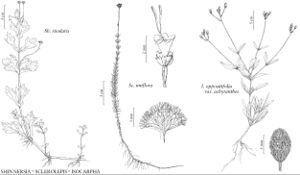Difference between revisions of "Isocarpha oppositifolia var. achyranthes"
Syst. Bot. 6: 280. 1981.
FNA>Volume Importer |
FNA>Volume Importer |
||
| Line 7: | Line 7: | ||
|year=1981 | |year=1981 | ||
}} | }} | ||
| − | |basionyms={{Treatment/ID/ | + | |basionyms={{Treatment/ID/Basionym |
|name=Dunantia achyranthes | |name=Dunantia achyranthes | ||
|authority=de Candolle | |authority=de Candolle | ||
| + | |publication_title=in A. P. de Candolle and A. L. P. P. de Candolle, Prodr. | ||
| + | |publication_place=5: 627. 1836 | ||
}} | }} | ||
|synonyms= | |synonyms= | ||
| Line 26: | Line 28: | ||
|elevation=0–10 m | |elevation=0–10 m | ||
|distribution=Tex.;Mexico;Central America;South America. | |distribution=Tex.;Mexico;Central America;South America. | ||
| − | |discussion=<p>The Texas plants are known only from around Brownsville in Cameron County. D. J. Keil and T. F. Stuessy (1981) identified them as var. oppositifolia, noting that they are “probably introduced” there. Distribution of the species continues from Cameron County southward along the Gulf coast of Mexico in Tamaulipas and Veracruz, and the Texas plants are similar to the Mexican ones, which have been identified as <i></i>var.<i> achyranthes</i>. Abundant Texas material, as described above, fits the description of <i></i>var.<i> achyranthes</i>, as delimited by Keil and Stuessy.</p> | + | |discussion=<p>The Texas plants are known only from around Brownsville in Cameron County. D. J. Keil and T. F. Stuessy (1981) identified them as var. oppositifolia, noting that they are “probably introduced” there. Distribution of the species continues from Cameron County southward along the Gulf coast of Mexico in Tamaulipas and Veracruz, and the Texas plants are similar to the Mexican ones, which have been identified as <i></i></i>var.<i><i> achyranthes</i>. Abundant Texas material, as described above, fits the description of <i></i></i>var.<i><i> achyranthes</i>, as delimited by Keil and Stuessy.</p> |
|tables= | |tables= | ||
|references= | |references= | ||
| Line 50: | Line 52: | ||
|publication year=1981 | |publication year=1981 | ||
|special status= | |special status= | ||
| − | |source xml=https://jpend@bitbucket.org/aafc-mbb/fna-data-curation.git/src/ | + | |source xml=https://jpend@bitbucket.org/aafc-mbb/fna-data-curation.git/src/f6b125a955440c0872999024f038d74684f65921/coarse_grained_fna_xml/V19-20-21/V21_1236.xml |
|tribe=Asteraceae tribe Eupatorieae | |tribe=Asteraceae tribe Eupatorieae | ||
|genus=Isocarpha | |genus=Isocarpha | ||
Revision as of 19:46, 24 September 2019
Stems: nodes without axillary fascicles. Leaves mostly sessile, sometimes ± petiolate; blades mostly 2–3(–5) cm × 5–8(–15) mm, without basal auricles. Heads pedunculate (peduncles 2–5 cm) or subsessile (in groups of 2–5). Corollas ca. 1.5 mm. Cypselae ca. 1.5 mm. 2n = 20.
Phenology: Flowering (Jun–)Oct–Dec.
Habitat: Thickets, clay dunes, shrublands
Elevation: 0–10 m
Distribution

Tex., Mexico, Central America, South America.
Discussion
The Texas plants are known only from around Brownsville in Cameron County. D. J. Keil and T. F. Stuessy (1981) identified them as var. oppositifolia, noting that they are “probably introduced” there. Distribution of the species continues from Cameron County southward along the Gulf coast of Mexico in Tamaulipas and Veracruz, and the Texas plants are similar to the Mexican ones, which have been identified as var. achyranthes. Abundant Texas material, as described above, fits the description of var. achyranthes, as delimited by Keil and Stuessy.
Selected References
None.
